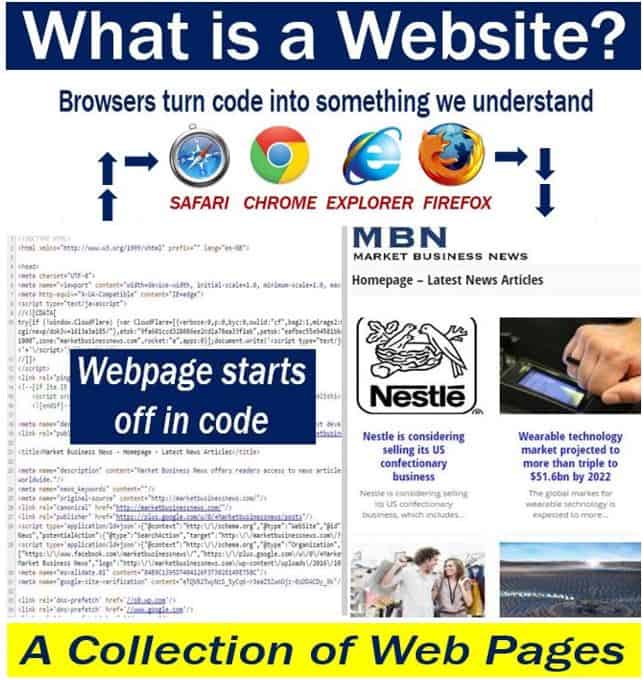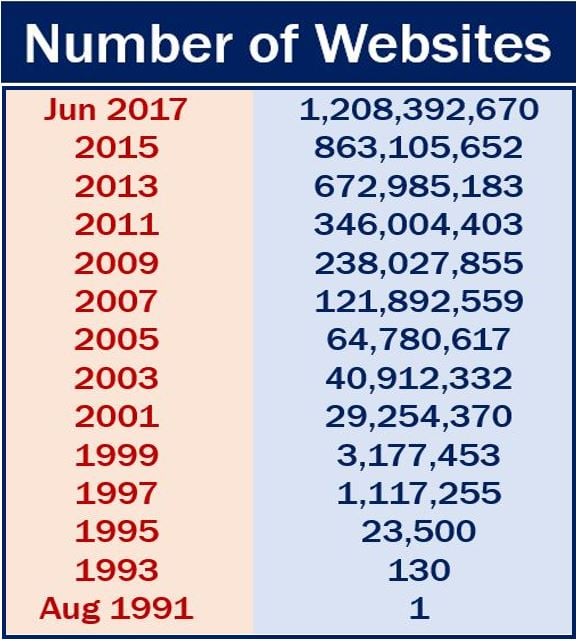A Website or Site is a virtual location on the World Wide Web (WWW). It contains several web pages and data files that Internet users can access through a browser. Chrome, and Bing, for example, are browsers. Firefox and Safari, are also browsers.
Every website has its own unique URL, i.e., website address. If you type that address at the top of your browser, the homepage of your target website will appear.
We can also write the words ‘website’ and ‘webpage’ as two words, i.e., ‘web site’ and ‘web page’.
According to the Online Etymology Dictionary, the term ‘Website’ emerged in the English language in 1994. It is a combination of ‘Web,’ i.e., in the Internet sense, plus Site.
Etymology is the study of the origin of words and how their meanings evolved over time.
Every site’s web address starts with ‘http://’. ‘http’ stands for HyperText Transfer Protocol’, which allows for the retrieval of linked resources from across the World Wide Web (WWW).

The homepage is the default or start-up page on a browser. In other words, is the website’s introductory page, which typically serves as a table of contents for the whole site.
The homepage contains hyperlinks to other pages on the same or other sites.
Website vs. webpage
A webpage is not the same thing as a website. Many people mistakenly use the two terms interchangeably.
A website is a collection of webpages. For example, https://www.nytimes.com is the website of the New York Times. It consists of hundreds of thousands of webpages. Giant sites, such as Wikipedia and Amazon, for example, contain millions of webpages.
A book is a collection of printed pages. Similarly, a website is a collection of webpages.
 Computers, which we call ‘servers, store or host files or documents that make up websites. When you instruct your browser to look at a website, it sends a request through the Internet to the server where that site is hosted. The server then responds by sending that page back to your browser.
Computers, which we call ‘servers, store or host files or documents that make up websites. When you instruct your browser to look at a website, it sends a request through the Internet to the server where that site is hosted. The server then responds by sending that page back to your browser.
The browser presents that data on your screen in a way that makes sense to you. In other words, the browser is an ‘interpreter.’
Each webpage generally has hyperlinks, i.e., words or images that take you somewhere. They may take you either to another webpage within the same site or another website. They can also take you to another part of the same page.
Functions of a website
Websites may have many functions and can be used in a wide range of fashions. For example, a site may be:
- a commercial site
- a personal site
- a non-profit organization site
- a government site
- an online school or college
- an online newspaper or journal
- a social networking site
- an entertainment site
All the websites that the public has access to collectively make up the World Wide Web. We also refer to it as the Web or WWW. Private sites, such as those for companies and their staff, are generally part of an intranet.
Many sites are subscription websites, i.e., you need to apply to join. They then give you a username and password, which you must use every time you log in.
Newspapers, journals, gambling sites, and message boards, for example, are subscription websites. Email services, social networking sites, and stock market data sites also require subscriptions.

CERN technicians created the first website. CERN stands for Organisation Européenne pour la Recherche Nucléaire (English: European Organization for Nuclear Research).
Technicians at CERN uploaded a file to what was then an infant Internet.
The organization took down the site in 1993 because people considered it to be irrelevant by then. However, in 2013, it was restored because of its historical importance.
Static or interactive websites
There are two main types of sites – interactive and static:
– Interactive sites form part of the Web 2.0 community of sites. They allow for interactivity between their owners and visitors or users. Put simply, on this type of website you can interact with it.
– Static sites capture or serve information. However, they do not allow interactivity with the users or audience directly.
The Web has many different types of websites, each specializing in a particular type of use or content. We classify them as:
– Affiliate – a site with few pages whose purpose is to sell a third party’s good or service. The owner of the website subsequently receives a commission on sales.
– Archive sites are used to preserve valuable electronic content. In fact, many face the threat of extinction.
– Attack sites have malicious intent. In other words, people specifically design them to attack visitors’ computers, tablets, or smartphones.
– Blogs (Web Logs) are typically used to post online diaries which often include discussion forums. Owners of blogs are called ‘bloggers’.
– Crowdfunding sites are platforms to raise finance or sponsorship for projects. People can pre-purchase goods. They can also make donations.
Wikipedia has a comprehensive list of different types of websites.
 Over the past twenty-six years, the number of websites globally has increased from just 1 in 1991 to more than one billion today. In fact, the Web and the Internet have completely changed how humans work, rest and play. (Data Source: internetlivestats.com)
Over the past twenty-six years, the number of websites globally has increased from just 1 in 1991 to more than one billion today. In fact, the Web and the Internet have completely changed how humans work, rest and play. (Data Source: internetlivestats.com)
World’s most popular websites
Below is a list of the world’s most popular websites, according to Semrush Open .Trends:
- Google Search: A search engine for finding information online.
- YouTube: A platform for sharing and watching videos.
- Facebook: A social networking site for connecting with friends and sharing content.
- Instagram: A social media platform focused on photo and video sharing.
- Twitter: A microblogging service for sharing short messages called tweets.
- Baidu: A Chinese search engine and web services company.
- Wikipedia: A free online encyclopedia with collaboratively edited content.
- Yahoo: A web services provider offering search, news, and email.
- Yandex: A Russian multinational corporation specializing in Internet-related products and services, including search and information services.
- WhatsApp: A messaging app for text, voice, and video communication.
There is one thing all the most successful websites have in common. They have a very simple look and design. Therefore, when you develop a website, above all, follow the KISS Principle. KISS stands for Keep It Simple, Stupid! Complicated websites fail!
Compound phrases
There are numerous compound phrases in the English language that contain the term ‘website.’ None of them existed before the advent of the Internet. Let’s have a look at the five most commonly used ones:
-
Website Design
The process of creating the layout, visual appearance, and structure of a website. If you are not sure how to create a website, you should consider contracting a designer.
-
Website Traffic
The amount of data sent and received by visitors to a website, is often used as a measure of its popularity. The term may also refer simply to the number of visitors a site gets per day, week, or month.
-
Website Hosting
A service that allows you to make your website accessible on the internet. Your website may be hosted by a company nearby or thousands of miles away.
You can, if you want, host your own website with your own physical server. However, it can be a difficult process to configure, and the responsibility of making your website available at all times will be solely yours.
-
Website Development
The work involved in building a website, encompassing web design, content development, and scripting. It is the foundation of a successful online presence.
According to wikipedia.com: “Web development can range from developing a simple single static page of plain text to complex web applications, electronic businesses, and social network services.”
-
Website Navigation
The system allows visitors to move around a website, including menus, links, and other tools for browsing through pages. Navigation is an essential part of web design.
“Good website navigation provides clear and simple navigation bars and links that encourage visitors or people to explore more and more,” says geeksforgeeks.com.
Video – What is a Website?
This educational video, from our sister channel on YouTube – Marketing Business Network, explains what ‘Website’ means using simple and easy-to-understand language and examples.
